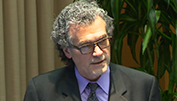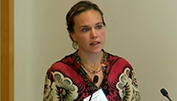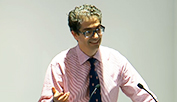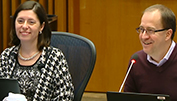-
- NIH VideoCast - NIMHD Advisory Council - June 2017
-
- - NIMHD, NIH (2017/06/08)
- - Category : Advisory Board Meetings and Workshops
- This is the June 2017 NIMHD Advisory Council meeting.
NIH VideoCast - NIMHD Advisory Council - June 2017
-
- NIH VideoCast - Production, characterization, and application of stem cell-derived photoreceptors
-
- - David M. Gamm, M.D., Ph.D., Emmett A. Humble Distinguished Director, McPherson Eye Research Institute, Sandra Lemke Trout Chair, Eye Research, associate professor of ophthalmology and visual sciences, University of Wisconsin-Madison (2017/06/08)
- - Category : Special
- NEI AGI Seminar in Neuroregenerative Medicine
3-D organoids are the next big thing in disease modeling, drug screening, and tissue sourcing for transplantation. These miniature organs can be grown from patient-derived stem cells, providing a theoretically unlimited supply.
David Gamm, M.D., Ph.D., will summarize efforts to develop retinal organoids derived from human pluripotent stem cells. The retina is the light-sensitive tissue in the back of the eye that sends visual signals to the brain. The most common blinding conditions in the U.S. affect the retina, including age-related macular degeneration, diabetic retinopathy, and glaucoma. Many rare conditions, such as retinitis pigmentosa, also affect the retina. Retina organoids are the subject of a recently launched NEI 3-D Retina Organoid Challenge.
Gamm is the Emmett A. Humble Distinguished Director of the McPherson Eye Research Institute, the Sandra Lemke Trout Chair in Eye Research, and an associate professor of ophthalmology and visual sciences at the University of Wisconsin-Madison. He investigates the cellular and molecular events that occur during human retinal development. A major focus of his work is generating cells for retinal disease modeling and cell replacement therapies. His lab???s efforts are ultimately directed toward creating and testing stem cell-based strategies to delay or reverse the effects of blinding retinal disorders.
The NEI AGI Seminar Series in Neuroregeneration explores topics relevant to regenerative neuroscience and medicine, with special emphasis on the visual system.
NIH VideoCast - Production, characterization, and application of stem cell-derived photoreceptors
-
- NIH VideoCast - CC Grand Rounds: (1) Vascular Remodeling in Mice and Man: KATP Channel Openers as Rational Therapeutics for the Treatment of Williams Beuren Syndrome and (2) New insights from the Rare Inherited Vascular Calcification Disease ACDC
-
- - 1) Beth Kozel, MD, PhD, Investigator and Lasker Clinical Research Scholar, Laboratory of Vascular and Matrix Genetics, NHLBI, NIH and 2) Manfred Boehm, MD Senior Investigator, Laboratory of Cardiovascular Regenerative Medicine, NHLBI, NIH (2017/06/08)
- - Category : Clinical Center Grand Rounds
- CC Grand Rounds:(1) Vascular Remodeling in Mice and Man: KATP Channel Openers as Rational Therapeutics for the Treatment of Williams Beuren Syndrome and (2) New insights from the Rare Inherited Vascular Calcification Disease ACDC
For more information go to http://www.cc.nih.gov/about/news/grcurrent.html
NIH VideoCast - CC Grand Rounds: (1) Vascular Remodeling in Mice and Man: KATP Channel Openers as Rational Therapeutics for the Treatment of Williams Beuren Syndrome and (2) New insights from the Rare Inherited Vascular Calcification Disease ACDC
-
- NIH VideoCast - PAIN Consortium Symposium (Day 1)
-
- - National Pain Consortium (2017/06/07)
- - Category : Conferences
- The NIH Pain Consortium was established to enhance pain research and promote collaboration among researchers across the many NIH Institutes and Centers that have programs and activities addressing pain. The consortium supports initiatives, development of research resources and tools, and hosts events to promote collaboration and highlight advances in pain research.
Visit http://painconsortium.nih.gov
For more information go to http://www.youreventinfo.org/PainConsortiumSymposium2017/index.html
NIH VideoCast - PAIN Consortium Symposium (Day 1)
-
- NIH VideoCast - PAIN Consortium Symposium (Day 2)
-
- - National Pain Consortium (2017/06/07)
- - Category : Conferences
- The NIH Pain Consortium was established to enhance pain research and promote collaboration among researchers across the many NIH Institutes and Centers that have programs and activities addressing pain. The consortium supports initiatives, development of research resources and tools, and hosts events to promote collaboration and highlight advances in pain research.
Visit http://painconsortium.nih.gov
For more information go to http://www.youreventinfo.org/PainConsortiumSymposium2017/index.html
NIH VideoCast - PAIN Consortium Symposium (Day 2)
-
- NIH VideoCast - Inclusion Across the Lifespan (Day 1)
-
- - National Institutes of Health (2017/06/07)
- - Category : Conferences
- Tremendous progress has been made in the management of human diseases through the development of new therapeutics and devices that were tested in clinical trials. However, pediatric and older populations may be excluded from these trials, and these exclusions limit the generalizability of study results to some age groups that bear a high burden of certain diseases and disorders. While greater than 60% of new cancer cases occur in elders, they represent less than 32% of participants in cancer clinical trials (1). Similar trends were found when clinical trials testing agents to treat many common diseases of elders were analyzed (2). For many years, the lack of children in clinical trials has been recognized (3,4). Despite efforts to increase inclusion of children in clinical trials and clinical studies, children still receive medications tested primarily in adults, as trials in children are more challenging.
It is likely that younger and older individuals respond differently to available therapeutics or that the spectrum of a disease will vary by age. While there may be safety concerns with the inclusion of children and frail and dependent elders in trials, convention is probably the reason for their exclusion from many studies. Artificial age restrictions or strict inclusion/exclusion criteria may have unknown impacts on the final sex/gender, race and ethnicity composition of a study population.
NIH recognizes the need to ensure the age range for a study of a given disease is scientifically appropriate so that study results are relevant to all affected populations. NIH Institutes and Centers, and the scientific community at large, also require a better understanding of the ages of participants and age enrollment gaps of those enrolled in trials and studies, including those sponsored by NIH. Therefore, a workshop will be convened to broaden our understanding of the impact of age-related and other eligibility restrictions on clinical trials and studies, and to identify barriers and facilitators to inclusion of subjects of all ages in research when possible. Input will be solicited at the workshop from investigators with expertise in the conduct of clinical studies with pediatric and older populations, ethics experts and other stakeholders.
Initial plans for a workshop to discuss issues pertaining to inclusion of research subjects of all ages were discussed at NIH???s Inclusion Governance Committee (IGC) in early 2016, after an extensive analysis of clinical trials by the National Institute of Aging. This analysis demonstrated that the age distribution of individuals enrolled in clinical trials for common diseases of older adults was much younger than the age distribution of the diseases in the US population. Another compelling reason for the workshop was the 21st Century Cures Act (Cures Act), P.L. 114-255, which became law on December 13, 2016. The Cures Act requires that a workshop on this issue be held by June 11, 2017, and that any needed inclusion policy updates be made within 180 days of the workshop.
For more information go to https://www.nia.nih.gov/about/events/2017/inclusion-across-lifespan
NIH VideoCast - Inclusion Across the Lifespan (Day 1)
-
- NIH VideoCast - Inclusion Across the Lifespan (Day 2)
-
- - National Institutes of Health (2017/06/07)
- - Category : Conferences
- Tremendous progress has been made in the management of human diseases through the development of new therapeutics and devices that were tested in clinical trials. However, pediatric and older populations may be excluded from these trials, and these exclusions limit the generalizability of study results to some age groups that bear a high burden of certain diseases and disorders. While greater than 60% of new cancer cases occur in elders, they represent less than 32% of participants in cancer clinical trials (1). Similar trends were found when clinical trials testing agents to treat many common diseases of elders were analyzed (2). For many years, the lack of children in clinical trials has been recognized (3,4). Despite efforts to increase inclusion of children in clinical trials and clinical studies, children still receive medications tested primarily in adults, as trials in children are more challenging.
It is likely that younger and older individuals respond differently to available therapeutics or that the spectrum of a disease will vary by age. While there may be safety concerns with the inclusion of children and frail and dependent elders in trials, convention is probably the reason for their exclusion from many studies. Artificial age restrictions or strict inclusion/exclusion criteria may have unknown impacts on the final sex/gender, race and ethnicity composition of a study population.
NIH recognizes the need to ensure the age range for a study of a given disease is scientifically appropriate so that study results are relevant to all affected populations. NIH Institutes and Centers, and the scientific community at large, also require a better understanding of the ages of participants and age enrollment gaps of those enrolled in trials and studies, including those sponsored by NIH. Therefore, a workshop will be convened to broaden our understanding of the impact of age-related and other eligibility restrictions on clinical trials and studies, and to identify barriers and facilitators to inclusion of subjects of all ages in research when possible. Input will be solicited at the workshop from investigators with expertise in the conduct of clinical studies with pediatric and older populations, ethics experts and other stakeholders.
Initial plans for a workshop to discuss issues pertaining to inclusion of research subjects of all ages were discussed at NIH???s Inclusion Governance Committee (IGC) in early 2016, after an extensive analysis of clinical trials by the National Institute of Aging. This analysis demonstrated that the age distribution of individuals enrolled in clinical trials for common diseases of older adults was much younger than the age distribution of the diseases in the US population. Another compelling reason for the workshop was the 21st Century Cures Act (Cures Act), P.L. 114-255, which became law on December 13, 2016. The Cures Act requires that a workshop on this issue be held by June 11, 2017, and that any needed inclusion policy updates be made within 180 days of the workshop.
For more information go to https://www.nia.nih.gov/about/events/2017/inclusion-across-lifespan
NIH VideoCast - Inclusion Across the Lifespan (Day 2)
-
- NIH VideoCast - NIAID Advisory Counil Meeting - June 2017
-
- - Dr. Anthony S. Fauci, Director, NIAID (2017/06/07)
- - Category : National Institute of Allergy and Infectious Diseases
- Dr. Anthony S. Fauci will address the full council. Guest speakers Dr. John Mascola and Dr. Lawrence Tabak will address the full council
NIH VideoCast - NIAID Advisory Counil Meeting - June 2017
-
- NIH VideoCast - Mechanisms of Synapse Formation and Axon Regeneration
-
- - Yishi Jin, Ph.D., Professor and HHMI Investigator, Dept. of Cellular & Molecular Medicine, Division of Bioscience, University of California, San Diego (2017/06/07)
- - Category : Neuroscience
- NIH Neuroscience Series Seminar
The Jin lab research focuses on the molecular genetic mechanisms underlying the development and function of the nervous system using the nematode Caenorhabditis elegans. The transparency, defined anatomy, and rapid life cycle of this organism greatly facilitate their studies at the subcellular resolution. Moreover, the entre cell lineage and connectome are known, enabling functional understanding at deep levels. Through forward genetic screening in combination with multi-layered molecular and cellular manipulations, they are discovering key molecules that play conserved roles in synapse formation, maintenance, and function, as well as those underlying adult axon regeneration. Their goal is to connect the studies of basic mechanisms to the understanding of human neurological disorders and neuronal repair.
For more information go to https://neuroscience.nih.gov/neuroseries/Home.aspx
NIH VideoCast - Mechanisms of Synapse Formation and Axon Regeneration
-
- NIH VideoCast - AIDS Research Advisory Committee - June 2017
-
- - Division of AIDS, NIAID, NIH (2017/06/07)
- - Category : AIDS Research Advisory Committee
- June 5, 2017 AIDS Research Advisory Committee Meeting
NIH VideoCast - AIDS Research Advisory Committee - June 2017
-
- NIH VideoCast - Division of Allergy, Immunology and Transplantation Subcommittee - June 2017
-
- - NIAID, NIH (2017/06/07)
- - Category : National Institute of Allergy and Infectious Diseases
- Report from Division Director and Division Staff
NIH VideoCast - Division of Allergy, Immunology and Transplantation Subcommittee - June 2017
-
- NIH VideoCast - Division of Mircobiology and Infectious Diseases Subcommittee - June 2017
-
- - NIAID, NIH (2017/06/07)
- - Category : National Institute of Allergy and Infectious Diseases
- Report from Division Director and Division Staff
NIH VideoCast - Division of Mircobiology and Infectious Diseases Subcommittee - June 2017
-
- NIH VideoCast - Clinicopathologic Grand Rounds: Clinical Cases from the NIH Clinical Center: Targeting the Genetic and Metabolic Basis of Fumarate Hydratase-Deficient Kidney Cancer: Hereditary Leiomyomatosis and Renal Cell Carcinoma
-
- - 1) Ashkan Malayeri, MD Staff Clinician Radiology and Imaging Sciences, CC, NIH, 2) Maria J. Merino, MD Chief, Translational Pathology, Laboratory of Pathology, NCI, NIH and 3) W. Marston Linehan, MD, Surgeon-in-Chief, NIH; Chief, Urologic Oncology Branch, NCI, NIH (2017/06/02)
- - Category : Clinical Center Grand Rounds
- Clinicopathologic Grand Rounds: Clinical Cases from the NIH Clinical Center: Targeting the Genetic and Metabolic Basis of Fumarate Hydratase-Deficient Kidney Cancer: Hereditary Leiomyomatosis and Renal Cell Carcinoma
For more information go to http://www.cc.nih.gov/about/news/grcurrent.html
NIH VideoCast - Clinicopathologic Grand Rounds: Clinical Cases from the NIH Clinical Center: Targeting the Genetic and Metabolic Basis of Fumarate Hydratase-Deficient Kidney Cancer: Hereditary Leiomyomatosis and Renal Cell Carcinoma
-
- NIH VideoCast - Thinking about cancer as an infectious disease
-
- - Patrick Moore, M.D., M.P.H., Distinguished and American Cancer Society Professor at University of Pittsburgh Cancer Institute (2017/06/02)
- - Category : WALS - Wednesday Afternoon Lectures
- The Wednesday Afternoon Lecture Series presents the annual George Khoury Lecture
Infection causes one in five cancers throughout the world. Why do just seven human viruses cause cancer, but not others? Merkel cell polyomavirus (MCV), the recently discovered cause of Merkel cell carcinoma (a rare type of skin cancer), provides clues on how viruses can cause cancer as well as insights into cancers that are not caused by infection. Tumor-virus studies reveal a fundamental duality between antiviral defenses and tumor suppression. MCV is an example in which mutations to our viral flora, not to the host cells themselves, help to turn this innocuous agent into the cause for the most aggressive skin cancer. MCV also reveals how a small virus, composed of just a few genes, can persist and successfully evade the immune system for decades. This feature has importance not only for viral cancers but also may give clues to other chronic viral infections.
About the Khoury lecture:
Organized by NIH scientists to honor the memory of cancer virologist George Khoury, M.D., who was highly regarded as a superb scientist and caring mentor of the postdoctoral fellows in his laboratory. Dr. Khoury, former chief of the Laboratory of Molecular Virology at the National Cancer Institute, was known for his instinctive inquisitive nature, unfaltering kindness, self-giving mentorship, and exceptional science.
For more information go to https://oir.nih.gov/wals/2016-2017
NIH VideoCast - Thinking about cancer as an infectious disease
-
- NIH VideoCast - Secretary???s Advisory Committee on Human Research Protections (SACHRP) Day 1
-
- - HHS (2017/06/01)
- - Category : Secretary`s Advisory Committees
- SACHRP provides expert advice and recommendations to the Secretary, through the Assistant Secretary for Health, on issues and topics pertaining to or associated with the protection of human research subjects. The committee is composed of 11 appointed voting members, with additional ex-officio members from Common Rule government agencies. SACHRP presently has two working subcommittees, the Subpart A Subcommittee (SAS) and the Subcommittee on Harmonization (SOH). The May 25, 2017 meeting will include reports from both subcommittees, including recommendations concerning the following regulatory provisions of the new final rule: compliance and transition provisions, .101(l); benign behavioral intervention, .104(d)(3); and broad consent, .116(d). Time is allotted for public comment.
NIH VideoCast - Secretary???s Advisory Committee on Human Research Protections (SACHRP) Day 1
-
- NIH VideoCast - NIH Council of Councils - May 2017
-
- - NIH (2017/06/01)
- - Category : Council of Councils
- The NIH Council of Councils advises the NIH Director on on the policies and activities of the Division of Program Coordination, Planning, and Strategic Initiatives (DPCPSI) in the Office of the Director, NIH. The Council also carries out concept clearance for grant programs proposed by the DPCPSI Office of Research Infrastructure Programs (ORIP) and the NIH Common Fund, and conducts second-level review of proposed ORIP grant awards, awards for the Common Fund Transformative Research Award and Early Independence Award Programs, and awards for the Environmental influences on Child Health Outcomes and All of Us Research Programs.
For more information go to https://dpcpsi.nih.gov/council/index
NIH VideoCast - NIH Council of Councils - May 2017
-
- NIH VideoCast - Secretary???s Advisory Committee on Human Research Protections (SACHRP) Day 2
-
- - HHS (2017/06/01)
- - Category : Secretary`s Advisory Committees
- SACHRP provides expert advice and recommendations to the Secretary, through the Assistant Secretary for Health, on issues and topics pertaining to or associated with the protection of human research subjects. The committee is composed of 11 appointed voting members, with additional ex-officio members from Common Rule government agencies. SACHRP presently has two working subcommittees, the Subpart A Subcommittee (SAS) and the Subcommittee on Harmonization (SOH). The May 26, 2017 meeting will include reports from both subcommittees, including recommendations concerning the expedited review list, .110, under the new final rule. There will also be continued discussion of two SOH recommendations carried over from the previous SACHRP meeting, one on the Return of Incidental Findings and the other on the FDA Draft Guidance ???Use of Real-World Evidence to Support Regulatory Decision-Making for Medical Devices.??? Time is allotted for public comment
For more information go to http://videocast.nih.gov/info/login.aspx?b9abce58-9e00-473e-9712-948c0ab973c2-01
NIH VideoCast - Secretary???s Advisory Committee on Human Research Protections (SACHRP) Day 2
-
- NIH VideoCast - All of Us Research Program Advisory Panel Meeting - May 2017
-
- - NIH (2017/05/31)
- - Category : Advisory Board Meetings and Workshops
- All of Us Research Program Advisory Panel Meeting
NIH VideoCast - All of Us Research Program Advisory Panel Meeting - May 2017
-
- NIH VideoCast - NIGMS Council Open Session - May 2017
-
- - NIGMS, NIH (2017/05/31)
- - Category : Advisory Board Meetings and Workshops
- This is the public broadcast of the NIGMS May 2017 Council for the Open Session
NIH VideoCast - NIGMS Council Open Session - May 2017
-
- NIH VideoCast - ICCVAM 2017 Public Forum
-
- - NTP Interagency Center for the Evaluation of Alternative Toxicological Methods (2017/05/26)
- - Category : Advisory Board Meetings and Workshops
- ICCVAM`s goals include promotion of national and international partnerships between governmental and nongovernmental groups, including academia, industry, advocacy groups, and other key stakeholders. To foster these partnerships, ICCVAM holds annual public forums to share information and facilitate direct communication of ideas and suggestions from stakeholders. This year`s public forum will focus on an effort, coordinated by ICCVAM, to explore new approaches for evaluating the safety of chemicals and medical products in the United States.
For more information go to https://ntp.niehs.nih.gov/go/iccvamforum-2017
NIH VideoCast - ICCVAM 2017 Public Forum






















